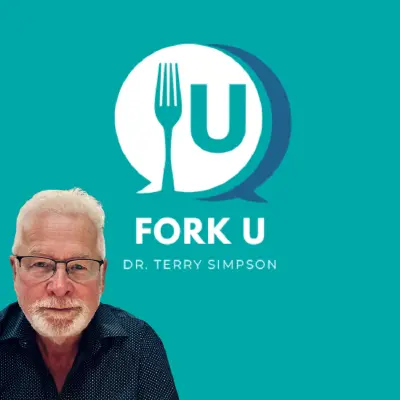Podcasts about Life Sciences
Episodes about Life Sciences

Jul 10, 2025
Ep 154: A 58-Year-Old Going for Surgery
Harrison's PodClass: Internal Medicine Cases and Board Prep ❭
Evaluation needed for a patient preparing for elective surgery.Read more on this topic in Harrison's.Harrison's Principles of Internal Medicine, 22nd Edition
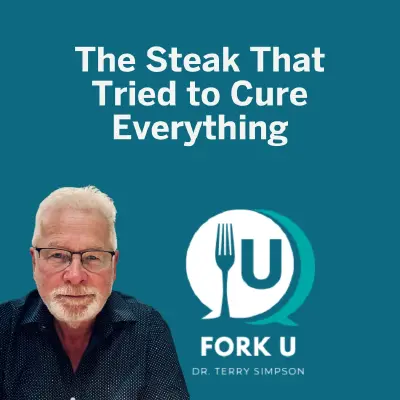
Who Was Dr. Salisbury?First, let’s meet the man behind the meat.Dr. James Henry Salisbury was a doctor during the American Civil War. He worked hard to understand why so many soldiers got sick. He noticed that stomach problems like diarrhea and dysentery were everywhere in the army camps.Because of this, he believed the problem came from food. But instead of looking at germs, he blamed vegetables.That’s right—he thought vegetables caused disease. To children everywhere, he became a hero. To science? Not so much.What Did He Believe?Dr. Salisbury believed that vegetables and starchy foods rotted in the gut. He said they caused inflammation and sickness. He thought the best way to stop disease was to eat meat—and only meat.So, he created a special food: the Salisbury steak.This steak wasn’t fancy. He ground up lean beef, shaped it into a patty, and told people to eat it three times a day. With it, they could drink only hot water or black coffee.No fruit.Absolutely no sugar.No grains.And definitely no vegetables.Why Did It Seem to Work?At first, some people felt better on the Salisbury diet. But why?Here’s the real reason: it wasn’t the meat. It was the boiling.Back then, most water carried bacteria. That bacteria caused all kinds of sickness. When soldiers boiled coffee, they accidentally killed the germs in the water. When they ate fully cooked meat, they avoided raw, dirty food.So yes, people improved. But not because vegetables were bad.They got better because boiled water and cooked meat killed bacteria.What Did He Get Wrong?Now, let’s talk about what he missed.❌ He didn’t understand germs or bacteria❌ He thought fiber was dangerous❌ He blamed plants, even though they weren’t the problem❌ He didn’t test his ideas—he just believed themHe meant well, but he built a health plan on the wrong cause.Instead of fixing the real issue, he created a food myth that lasted for years.Why Does This Still Matter?Even though Dr. Salisbury lived over 150 years ago, his ideas are back—on TikTok.Some people today say meat is the only healthy food. They avoid fruits, grains, and vegetables. They blame plants for everything from bloating to brain fog.Sound familiar?They’re repeating Salisbury’s mistake. They’re trusting old beliefs instead of new science.What Science Says NowLet’s be clear. Science today tells a different story.✅ Vegetables help your gut, heart, and brain✅ Fiber feeds healthy gut bacteria✅ A variety of foods lowers your risk of disease❌ Eating only meat can cause nutrient problems and long-term risksInstead of eating like it’s 1863, you can follow a plan that supports your body and your taste buds.The best example? The Mediterranean diet—with healthy fats, lean protein, vegetables, fruits, and yes… even a little red wine.In SummaryDr. Salisbury had a strong idea—but he missed the mark.He didn’t know about bacteria. He thought vegetables were the enemy. He gave us Salisbury steak, but also gave us a lasting food myth.So next time someone says vegetables cause disease, just smile and say: “We’ve been down that road. It was dusty, undercooked, and came
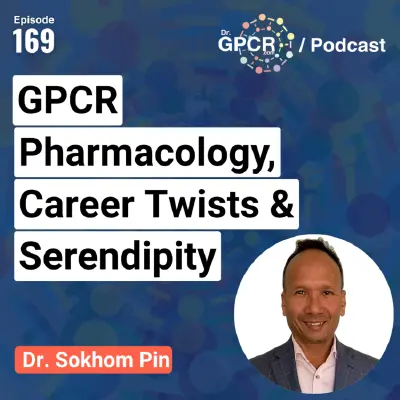
Jul 08, 2025
GPCR Pharmacology, Career Twists & Serendipity with Dr. Sokhom Pin / Dr. GPCR Podcast #169
Dr. GPCR Podcast ❭
Watch the video version of this podcast episode.https://www.ecosystem.drgpcr.com/dr-gpcr-podcast/ep-169-with-dr-sokhom-pin---------------------------------Become a #DrGPCR Ecosystem Member---------------------------------Imagine a world in which the vast majority of us are healthy.The #DrGPCR Ecosystem is all about dynamic interactions between us working towards exploiting the druggability of #GPCRs. We aspire to provide opportunities to connect, share, form trusting partnerships, grow, and thrive together.---------------------------------To build our #GPCR Ecosystem, we created various enabling outlets.Premium YearlyPremium Yearly for TeamsDeveloping CountriesAre you a #GPCR professional?Subscribe to the Classified GPCR Weekly NewsListen and subscribe to #DrGPCRPodcast
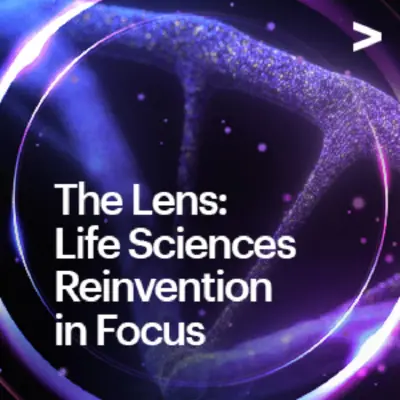
Jul 08, 2025
Marketing Pharma’s Future with GenAI and Purpose
The Lens: Life Sciences Reinvention in Focus ❭
Discover how digital innovation and Gen AI are reshaping pharma with Anvita Karara. Explore how patient-centricity, personalization, and responsible AI are driving better health outcomes and transforming engagement at scale.

Jul 08, 2025
416 The Meridian Is the Message- A Clinical Cartography of Emotion, Thought and Physiology • Andreas Brüch
Qiological Podcast ❭
Ever wonder if the body tells its own version of your inner story? That maybe the channels don’t just carry qi—but also the shape of your longings, the tempo of your fears, and the echo of old emotional weather? What if meridians are a kind of cartography, not just for physiology, but for the inner landscape of the self?In this conversation with Andreas Brüch, we explore how Saam acupuncture offers a tri-dimensional system for working with emotion, physiology, and the mind. Andreas brings a background in psychology and decades of clinical practice to this discussion on the inseparability of mental and physical experience—and how Korean Saam theory makes that relationship clinically usable.Listen into this discussion as we explore the tri-axial framework of damp/dry, hot/cold, and inward/outward movement; how meridians can reflect patterns of hunger, power, and satisfaction; and why emotional imbalance might be best addressed through constitutional physiology.This one’s for anyone who’s ever sensed that symptoms are also signals—that the channel system is more than flow, it’s also the message.

Jul 07, 2025
Welcoming Wisdom #4 - Awe, Ethics, and the Sacred Path to Flourishing
Flourish As You Age ❭
Comments? Send me a text message.In this final episode of our opening series on Flourishing, we explore the deeper dimensions of what it means to live a meaningful and well-lived life. Drawing from awe research, contemplative neuroscience, and classical philosophy, we reflect that flourishing is not a fixed state but an emergent, relational process—one shaped by attention, moral insight, and reverence for life itself.You’ll hear excerpts from Welcoming Wisdom: How Mature Minds Can Shape a Kinder, Wiser Future, including:A fresh take on awe as a catalyst for connection and transformationIain McGilchrist’s insights into the “sense of the sacred” as a mode of perceptionSocratic wisdom on the examined life and the moral core of flourishingA synthesis of ancient virtue ethics, modern psychology, and ecological well-beingThis episode concludes our foundational exploration of flourishing and sets the stage for the next series: The Mature Mind. Join us as we continue uncovering the unique capacities of aging minds to lead, imagine, and help shape a more compassionate world.Support the showIf you want to support this work, click above, subscribe to the MINDRAMP Podcast, or sign up for the free Flourish As You Age newsletter for reviews of current research, reflections, updates, and special extras from my book-in-progress
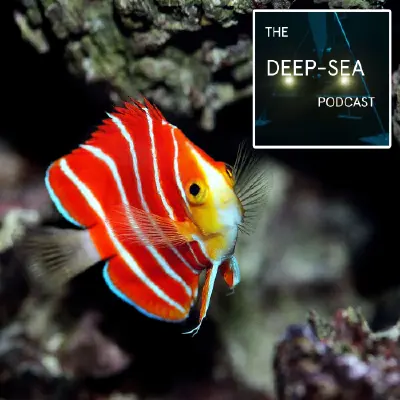
In this episode…
Sorry the episode is a little late…. But it’s a bumper!
Alan has been checking out hypercars while sharks have been checking out Thom. In the news, we have art, anglerfish, squid and sea spiders. Then an orafish turns up, and we are all doomed.
In this month's episode, we discuss mesophotic reefs, the deeper extents of coral reefs that have been overlooked in the past. It’s a wild ride that leads us to homemade hyperbaric chambers, the aquarium trade and the world’s most expensive fish. Strap in for a rollercoaster ride as we dive to the limits of scuba.
Support the show
The podcast is only possible with your help. Here’s a link to our page on how to support us, from the free options to becoming a patron of the show. We want to say a huge thank you to those patrons who have already pledged to support us:
Smorgindorg
Check out our podcast merch here!
Feel free to get in touch with us with questions or your own tales from the high seas on:
podcast@deepseapod.com
We’d love to actually play your voice so feel free to record a short audio note!
Thanks again for tuning in; we’ll deep-see you next time!
Find out more
at deepseapod.com
Social media
BlueSky: @deepseapod.com
Twitter: @DeepSeaPod
Instagram: @deepsea_podcast
Keep up with the team on social media
Twitter:
Alan - @Hadalbloke
Thom - @ThomLinley
Instagram:
Thom - @thom.linley
Inkfish - @inkfishexpeditions
BlueSky:
Thom @thomaslinley.com
Reference list
Discord Updates
Join our Patreon to get access to the Discord
The New Zealand wandering anemone
The supergiant amphipod wiki page
News
Under the Sea Exhibit
Anglerfish radiation paper
Alexe's website
Oarfish are turning up everywhere
Andrew and Thom’s oarfish blog
DOSI new podcast - Think Deep!
Marine Snow Carbon Transport
Methane Powered Sea-Spiders
Ancient Oceans filled with Squid
Interview
Kai’s website
Instagram
Bluesky
Twitter
Mesophotic fish collecting video
Taken by Ghislain Bardout from Under The Pole. The diver is Timothy Bennett, and he was collecting for the Australian Museum Research Expedition.
One of Kai’s recent mesophotic reef papers
The hyperbaric chamber for fishes
The paper where the chamber is described
FishPix
The peppermint Angelfish
Kai’s video of the peppermint angel
Teresa’s project
Her recent paper on black corals
Coffee with Andrew
Ribbonfish larvae paper
Glossary
BRUV - Baited Remote Underwater Video
Closed-circuit rebreather - An advanced form of scuba where your breath is recycled, and you don’t make any bubbles
Husbandry - Keeping an animal in captivity
IPFC - Indo-Pacific Fish Conference
Marine Snow - The particles that rain down to the seabed; poop, dead things, cast shells
Mesophotic Reef - The deeper extent of coral reefs where the light is reduced
Rebreather - See Closed-circuit rebreather
ROV - Remotely Operated Vehicle
Systematics - The structure and relationships between species
Credits
Theme: Hadal Zone Express by Märvel
Logo image: The peppermint angel by Yi-Kai Tea

When an influential right-wing thinker tells a story of human history, 'stagnation' and the 'antichrist'.. question his premise and maybe consult a narratologist.
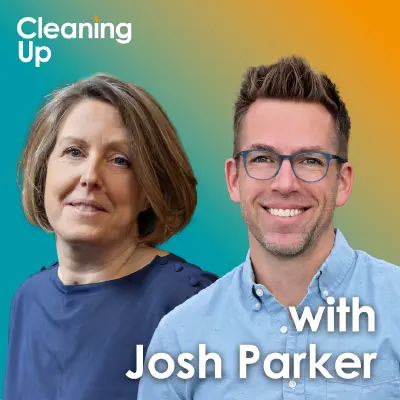
Jul 02, 2025
NVIDIA Rising: Will The AI Boom Bust The Planet? | Ep215: Josh Parker
Cleaning Up: Leadership in an Age of Climate Change ❭
In 1849, when the Gold Rush hit California, the people who were certain to make money were not the miners, but the sellers of picks and shovels. Indeed, America's first millionaire, Samuel Brannan, made his fortune by adding huge margins to everyday items that suddenly become high in demand. Today's sellers of picks and shovels are those providing the hardware and infrastructure to the software and platform providers, and one company stands apart as the beneficiary of the recent boom times in artificial intelligence: Nvidia. They're currently among the top three listed companies in the US, alongside Apple and Microsoft, and are incredibly profitable, with estimated margins in excess of 40%. They've been around for 30 years, and are much more than simply chip fabricators. This week on Cleaning Up, Bryony Worthington sits down with Josh Parker, Nvidia’s head of sustainability, to explore some of the challenges and opportunities he sees in the AI and Climate space.Leadership Circle: Cleaning Up is supported by the Leadership Circle, and its founding members: Actis, Alcazar Energy, Davidson Kempner, EcoPragma Capital, EDP of Portugal, Eurelectric, the Gilardini Foundation, KKR, National Grid, Octopus Energy, Quadrature Climate Foundation, SDCL and Wärtsilä. For more information on the Leadership Circle, please visit https://www.cleaningup.live. Discover more:Episode 204, the Sierra Leone special: https://www.youtube.com/watch?v=z-5QjSfy2SM Nvidia’s Sustainability Report:Earth2: https://www.nvidia.com/en-gb/high-performance-computing/earth-2/cBottle: https://catalog.ngc.nvidia.com/orgs/nvidia/teams/earth-2/models/cbottleMichael’s piece on AI efficiency: https://mliebreich.substack.com/p/ai-data-centre-power-and-glory-an

Jul 01, 2025
There isn't a problem | Nonduality - James Cooke, London, June 2025
Living Mirrors with Dr. James Cooke ❭
https://www.innerspaceinstitute.org/
